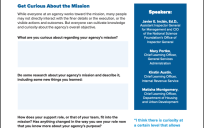A change in perspective can make a difference
- Are you tired – mentally, emotionally (& physically)?
- Do you have more to do than you have time & energy?
- Are you overwhelmed in trying to manage all of your emails, texts & voicemails?
I’d bet you also are behind in reading all of the blogs, articles and books that you feel you should. You probably feel overwhelmed and discouraged. Or just worn out. Welcome to the Busyness Club. I feel that way too. So do your team members and clients.
A personal story…
I grew up in a conservative Midwestern family and within the context of a family-owned business. Cussing was not acceptable, but one four-letter word was used. The worst thing you could be was LAZY. Everyone needed to be doing something or LOOK like you were being productive. While this has proven to serve me well professionally (I have co-authored three books and authored one, one of which has sold nearly 300,000 copies), I developed a life habit of keeping busy which has NOT been helpful to me personally.
Recently, I was busy as usual. In my type of work, there is always more I can do. But it was a beautiful evening, no wind, and I decided to accept an open invitation to go fishing at a friend’s pond. I went and had a great time. We hung out, shared stories from our past, caught some fish and enjoyed the beautiful evening. I came home and said to my wife, “I feel so much better when I don’t work all the time.” She asked (teasingly) if she could record me saying that and the next day she shared it with my team, to which they responded with a hearty laugh.
My story illustrates two main points:
First, I believe that one of the greatest threats to healthy workplaces is BUSYNESS. Individuals can only work at ‘full steam’ without stopping for so long before they reach the point of overload, becoming stressed and overwhelmed. This approach is not healthy for the individual or the company. As stress levels rise, people become forgetful, less able to focus and experience fatigue and other physical symptoms such as headaches, ulcers and even become physically ill. Obviously, these symptoms lead to reduced efficiency and productivity, which are counterproductive for the company. (Stressed out employees are not usually a lot of fun to work with, unless you enjoy irritable colleagues.)
The second important observation is that the only factor which changed when I went fishing with my friend was my perspective. I still had numerous work-related tasks to do, but I focused on the big picture and how “all work and no play” was making me a dull boy. I realized I needed to take some time for myself to recharge and that the world did not stop (or more importantly, my business did not fall apart) if I took some time to relax.
In reality, much of the busyness people experience can be reduced from a change in perspective. It may help to consider busyness by its definition: Busyness = having a lot to do within a limited amount of time. You feel as if the demands on your time (and energy) are greater than the time you have to complete the tasks.
A key to reducing busyness is finding ways to: a) reduce your demands, b) increase your resources or c) some combination of both. How do you accomplish these (seemingly impossible) goals? First, start with your perspective.
Let’s think about “demands.” Two aspects to consider are the importance and urgency of the tasks at hand. In addition to prioritizing and managing time, keep in mind that not all tasks that come up need to be addressed immediately, or even by you. Consider where a change of perspective might be beneficial.
1) You do not have to do everything that someone asks you to do. (This is a new thought for some of you. I can hear you asking, “You don’t? But what if …”) Stop doing things based on fear or just because someone else thinks you “should.” When possible, say NO to things that are not relevant to your goals and when your plate is already too full. Mature individuals understand and appreciate an honest, “I’m sorry, I just cannot do that for you.” (Immature or self-focused colleagues may become upset that you won’t “help them out, just this once.”)
2) Further, remember that other people can be a resource for accomplishing tasks. You do not have to be the Lone Ranger who does everything by yourself. Believe it or not, other people have skills and expertise to assist in completing important projects! You are not the most talented person in every task that needs to be done. Trusting someone other than yourself to do things may be difficult at first, but the time saved by recruiting others to help is well worth it! If the ‘control freak’ in you begins to hyperventilate when you consider delegating tasks, consider giving your team member specific details about what you believe success on the task will look like. Establishing time points to “check in” (at the beginning of the process), helps provide ways to keep track of progress and feedback can be incorporated in a timely manner.
Other ways to reduce busyness with a change in perspective:
1) Let go of 100% perfection. There are times when perfection on a project is needed, but sometimes, “good enough is good enough” (for example, when you are putting together the initial DRAFT of a project – by definition, a draft is first ideas with corrections to be made). Learn to make that distinction.
2) Similarly, cut yourself (and others) some slack. Mistakes will happen (that is if you work with people, machines or technology!) Sometimes we spend too much time dwelling on errors made. Acknowledge them, learn from them, make corrections and move on.
3) Think of taking time for yourself as an important part of getting the job done. You cannot function well on insufficient sleep, poor nutrition or an imbalance in work and other aspects of your life. Getting regular exercise (even just 30 minutes a few times a week) and taking part in hobbies like fishing, hiking, painting, yoga or even just unplugging from technology for a time will recharge you and make you better able to tackle whatever workplace challenges you face. Start small so you do not get overwhelmed trying to incorporate more into your already busy life. Any improvement in health habits is better than none.
4) Develop an “attitude of gratitude.” Research studies support the fact that taking time to appreciate the things that go well, the positive things in one’s life, as well as the people who are responsible for them, leads to greater satisfaction in life, more happiness, improved health and increased productivity. Each day, jot down on a notepad or journal (there are even gratitude apps!) three things that went well and take a moment to thank the people who played a part in making that happen.
While you are at it, why not learn how to best express appreciation in the workplace for your hardworking (and probably very busy) colleagues? Like journaling gratitude, learning to speak authentic, personally-relevant appreciation in the workplace is also linked to positive personal and career outcomes. This can be as simple as having you and your colleagues take an online inventory to determine which language of appreciation makes you feel most appreciated and sharing the results so that you can begin speaking each other’s languages. Doing so will be an investment well worth the returns.
In summary, busyness can be a train that keeps barreling down the tracks if you let it. But implementing some changes in perspective can give your life a healthy balance and keep your “engine” running efficiently.





I used to have a boss that always said, “there’s a difference between business and busyness.” That’s stuck with me since, and I’m glad you noted (#3) how focusing on yourself as part of your daily workload can actually boost your abilities in your day-to-day. Awesome post, and thank you for sharing!